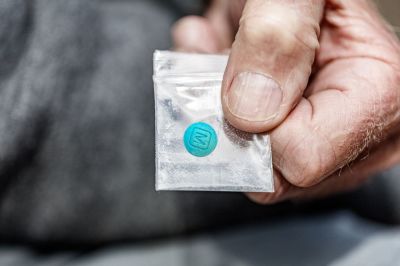Fentanyl is strong. Here's how to beat it.

Light shines brighter when darkness hovers. We can see farther at night, out into the expanse of stars surrounding us than we can during the day. These truths remind us that we must hold onto hope during a fentanyl crisis that is ravishing California communities.
California is the most affected state in the country for drug overdose deaths, and the death rate is rising. Our overdose deaths have tripled over the past three years.
Post-pandemic addiction among young men and women is killing a generation. Overdose deaths of young people aged 15-19 is rising. It doesn’t stop with our youth either. In Los Angeles County, opioid deaths are highest for ages 30-34.
Americans need to come to grips with the fact that fentanyl is 50 to 300 times stronger than morphine. It is no wonder that overdose rates for fentanyl are rising 2.5 times faster than those for heroin.
But as the world gets darker, hope still shines brighter. That’s why I never think any individual is too far gone down the path of drug abuse, and I still believe in supporting every individual who has felt lost and shattered from addiction. Freedom from this bondage is always just one step of humility away.
While those struggling with addiction have a long road ahead of them, there are also things that their friends, family and neighbors can do to be a part of the solution. Acts of mercy from anyone in their orbit can help addicts get off the slippery statistical slope that is headed to a life of misery and often ends in an early death.
Take Tayla for example, a woman in a recovery program where I work at the Dream Center. Tayla said by the time she was in high school her mother had become deeply depressed about her marriage. Tayla escaped the stress at home by experimenting with drugs. She soon dropped out of high school.
“My life completely derailed when I started using fentanyl,” Tayla told us. “I lost my job and the money I saved up for a car. Without enough money to support my habit, I was constantly experiencing withdrawal from the physical dependency I’d developed to the drug. I hopped from house to house, doing whatever it took to survive.”
Soon, Tayla was engaging in prostitution to support her habit. Then she fell in with another addict. “He was physically, mentally and emotionally abusive,” Tayla said.
Finally, Tayla gave up on going it alone to get out of the life that was killing her. She went to her sister’s house for help. Her sister loved her unconditionally, and then led her to us.
By all accounts, Tayla is actually one of the lucky ones. Parents, families, and communities have been shattered by the deaths of young people like Tayla. Most addicts engage in habits and live in circumstances that most of us would find unthinkable. And yet, when an addict reaches out to end their addiction, it’s time to put aside our judgments and take action.
Tayla was a completely broken human being when she first looked for help. To provide help to people like her, we have to look past the brokenness of her addiction and acknowledge that the circumstances which led her down a dark path could happen to anyone.
In Tayla’s case, it was an empathetic sister who first embraced her and took her in. Then many wonderful volunteers stepped in, judgment free, and showed her a place where she could become whole.
After seeking help, Tayla was able to earn a GED, improve her life skills, and work to heal from deep-rooted issues in her past. Today, in her third year of recovery, she is working full-time while pursuing a degree in psychology.
Miraculous restoration like this is possible when people act with love to reach out and lend a helping hand to those who want their lives restored to health. It’s important for each of us to stay humble, and not only respond to those looking for help, but to actively search for those who are struggling with this terrible curse on society. Tayla has proven a second chance is possible, and I’ve met thousands of others in my lifetime that have proven hope is never out of reach.
It’s also important to bear in mind that recovery takes years for most addictions. The path depends on other imperfect human beings to help them walk through a process and then continue to uncover the layers of the soul that lead to full restoration.
I’m proud to know amazing and brave individuals like Tayla. And I’m proud of her sister for looking past the scars on Tayla’s life and believing she still deserved unfailing love and support, as every other human being does.
It’s incumbent upon the rest of us, wherever we live, to recall the moments when others have still believed in us even in our darkest days, and then go and do the same for others. If that happens, I believe we’ll witness the unfolding of tremendous recovery in cities throughout this state, and across the U.S.
Matthew Barnett is the co-founder of the Los Angeles Dream Center and senior pastor of Angelus Temple. The Los Angeles Dream Center is a faith-based non-profit dedicated to transforming the lives of individuals and families in Los Angeles through residential and outreach programs.




















